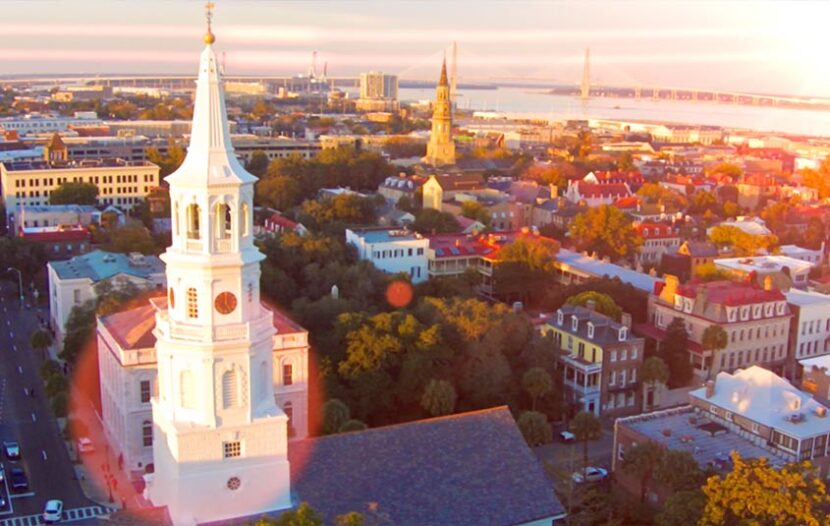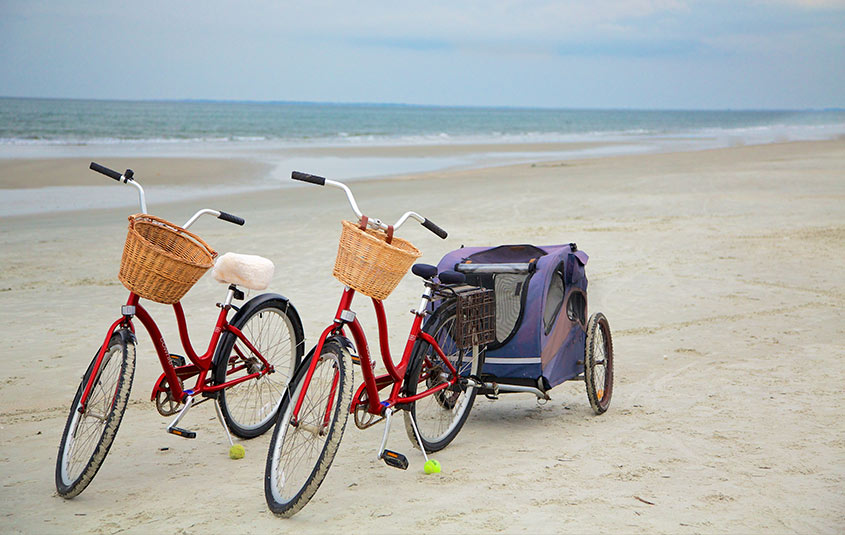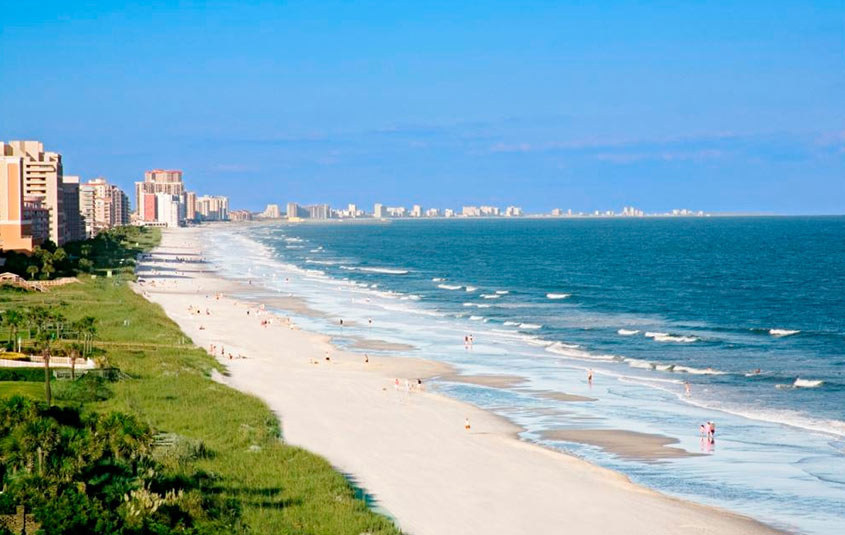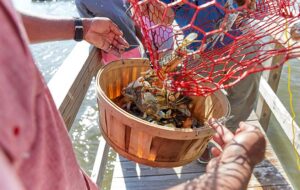From the Blue Ridge Mountains in the west, to the Atlantic Ocean in the east, South Carolina offers as much variety in its terrain as it does in its attractions and activities.
The state is divided into three regions. The upstate, anchored by the growing city of Greenville, is popular for outdoor activities and quaint mountain towns. The Midlands (Piedmont) region is home to the state capital of Columbia, famously known for its year-round summer climate. South Carolina’s coast encompasses historical gems like Charleston and Fort Sumter, as well as golf and beach havens like Hilton Head Island and Myrtle Beach.
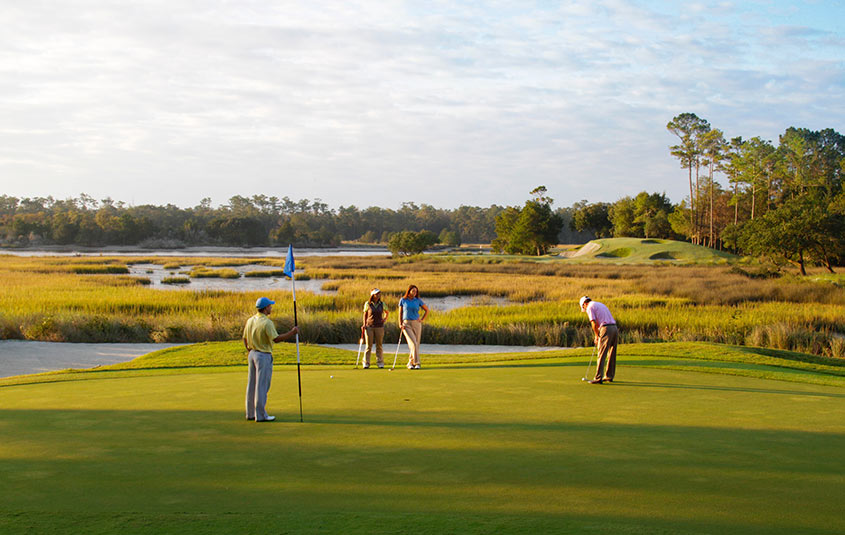
Golfing in Myrtle Beach
SAND TRAPS & SAND CASTLES
Bring your best clubs, because South Carolina is a year-round golf destination and home to more than 350 courses. You’re sure to find a course no matter when and where you visit, but the state’s top-ranked greens are generally concentrated along the coast. Notably, the Ocean Course at Kiawah Island Golf Resort is one of only four courses in the country to have hosted every major PGA event and is consistently rated one of the top courses in the world.
- Hilton Head, SC
- The beautiful Myrtle Beach coastline
If your idea of a perfect vacation is less ‘sand trap’ and more ‘sand castle,’ South Carolina offers 301 kilometres of picture-perfect coastline. Families tend to congregate in Hilton Head Island, with a plethora of bike trails and relaxing white-sand beaches, and Myrtle Beach, complete with affordable beachfront resorts and boardwalk amusements. More low-key beach goers can check out Isle of Palms, Folly Beach and Kiawah Island.
FROM CLASSICAL, TO COUNTRY
South Carolina hosts music events all over the state, celebrating every musical style from classical to country. Here’s a rundown of some of the best annual music festivals in South Carolina …
Bluegrass
Aiken Bluegrass Festival: Renowned for its one-of-a-kind music collaborations featuring regionally and nationally acclaimed bluegrass artists, this annual family-friendly two-day event draws music lovers from around the country each May.
Music on the Mountain at Table Rock State Park in Pickens: Local musicians gather each month in the park’s lodge to perform traditional bluegrass music. Visitors are invited to bring their acoustic instruments and join the free jam sessions held from 2 to 6 p.m.
Blues
Carolina Downhome Blues Festival in Camden: A Midlands staple for more than two decades, this popular October weekend event draws legendary blues artists from around the world performing everything from “roadhouse” blues rock to acoustic blues and folk music.
Country
Albino Skunk Music Fest in Greer: Originally founded as a bluegrass festival, this fall event held the first weekend in October now features a variety of acoustic music, including Americana, folk, alt-country, roots and bluegrass.
A DINING EXPERIENCE FOR EVERY PALATE
There are many different culinary traditions in South Carolina, from the Gullah kitchens of the Lowcountry, to classic Southern dishes such as shrimp and grits, to the fine dining establishments that make up Charleston’s renowned culinary scene.
- Sea to Table experience in McClellanville, SC
- McClellanville’s world famous seafood
- Fresh from the sea
From the mountainous Upstate to the Midlands to the coast, there’s a dining experience fit for every palate in the Palmetto State.
Producing locally made and harvested products is a large part of South Carolina’s culinary makeup. From fruits and vegetables to harvesting shrimp straight from the shores of the Atlantic Ocean, many ingredients that make up our finest dishes are grown right here in South Carolina. From sweet peaches to heirloom watermelons, pork for barbecue and briny oysters, the state is blessed with a bounty from the land and sea.
There are also numerous distilleries, breweries and wineries throughout the state that specialize in creating distinctly Southern beverages. If you’re looking for some moonshine, look no further than the Palmetto State. South Carolina also specializes in tables with a view, with restaurants and bars lining waterfronts and mountain vistas.
THE GULLAH CORRIDOR
The Gullah Corridor of the South Carolina coast is a landscape rich with tradition, stretching from the Sea Islands of the Lowcountry to the northern border of the state.
Stemming from the 18th century, when West Africans were brought to this region and enslaved on Southern plantations, the Gullah culture is still very much alive here – and its major historical landmarks remain popular South Carolina tourist attractions today.
